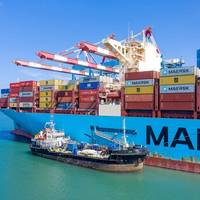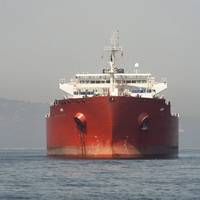Bunker Demand Returns to Pre-pandemic Levels

Asian refiners' profit from producing very low sulphur fuel oil (VLSFO) climbed to six-month highs this week as output cuts keep supplies tight while demand for the shipping fuel at most ports are back at pre-pandemic levels, traders and analysts said.The trend is likely to stay for the rest of the year, encouraging Asian refiners to prioritize VLSFO production along with petrochemical feedstock naphtha, where demand has also firmed.The front-month VLSFO crack was at $9.43 per barrel above Dubai crude on Tuesday, its highest since April 10.
Marine Fuel Market Facing Tougher Q3 as Supply Rises

Global supply of fuel oil, used by ships and power plants, is expected to grow in the third quarter, depressing the marine fuel market as shipping demand remains weak, analysts and trade sources said.Third-quarter supply is estimated to rise by 620,000 barrels per day (bpd) from the second quarter as China and Brazil increase production, according to consultancy Energy Aspects.This comes as inventories across key marine refueling hubs recently reached all-time highs, depressing bunker fuel prices and refiners' margins and dashing hopes for a profitable year for sellers of low sulfur fuel that
China to Issue VLSFO Quotas in Move to Grow Bunker Market Share

China is set to release its first-ever quotas to export very low sulphur fuel oil (VLSFO) with total volumes of 10 million tonnes for this year, six industry officials with knowledge of the matter said on Tuesday.The quotas, which came in the wake of Beijing’s policy in January to offer tax sweeteners to boost local production of the fuel, paves the way for Chinese refiners to almost fully cover the demand from its coastal bonded marine fuel market of 12-14 million tonnes annually.The quotas will be issued to four state-run firms - Sinopec Group, CNPC, China National Offshore Oil Company (CNOO
Euronav to Deploy ULCC for LSFO Storage

Euronav, one of the largest tanker companies in the world, will deploy one of its two ultra large crude carriers (ULCC) to store cleaner marine fuel ahead of a major regulatory change in 2020, the Belgium-headquartered group said on Friday.From January 2020, the International Maritime Organization (IMO) will ban ships from using fuels with a sulphur content above 0.5 percent, compared with 3.5 percent now, in one of the biggest changes in the oil market in decades.Only ships fitted…
Singapore's Bunker Market Rallies

The Singapore fuel oil market has rallied this week as inventories have dropped at the same time that some supplies in the region do not meet the standards for use as shipping fuel, further reducing the amount of supply available, five trade sources said.Cash premiums for 380-centistoke fuel oil, which is primarily sold for ship fuel, known as bunker fuel, have soared this week to the highest since May 2017. The premium of the prompt-month swap for the fuel over the second-month swap has jumped to the highest since October…
Mercuria, PetroChina Selling Offshore Stored Fuel Oil
Three to four tankers storing fuel oil, down from eight or nine. Independent trading house Mercuria and Chinese state oil giant PetroChina are selling fuel oil stored in vessels off Singapore and southern Malaysia on strong demand from the shipping and power sector, several trade sources said on Friday. The number of vessels storing fuel oil has halved from a month ago as Mercuria and PetroChina may have resold cargoes purchased over March to May, the sources said. Geneva-based Mercuria and PetroChina bought over 6 million tonnes of fuel oil over those months in oil pricing agency S&P Global Platts' trading period known as market-on-close (MOC). Their deals made up nearly three-quarters of the volumes traded in that period, according to data compiled by Reuters.
Singapore's Record Fuel Stocks Move to Floating Storage
Record high stocks of fuel oil in Singapore are pushing traders to store the shipping and feedstock fuel into tankers temporarily as demand slows regionally. At least seven very large crude carriers (VLCCs) have been provisionally fixed to store fuel oil on short-term time charters, traders and shipbrokers said. Lower oil prices have boosted refinery profits over most of this year, in turn driving refiners to maximise run rates and increase the supply of fuel oil in the region, traders said. Traders are also taking advantage of cheaper freight rates and a steep contango where prices of cargoes loading in the current month are cheaper than those loading in forward months.
Iranian Officials Say Condensate and Fuel Oil on Ships
As traders speculate over what type of oil is being kept by Iran in floating storage, two Iranian oil officials said on Thursday that the oil was condensate and fuel oil. The millions of barrels on ships could be delivered quickly to Iran's customers once sanctions are lifted and some traders believe a substantial part is crude, making them concerned about its impact on a global market already suffering a supply glut. "There is no crude oil in our floating storage, only condensate and fuel oil," said one of the officials, who declined to be identified due to company policy. Another official also said no crude was being stored. World powers and Iran reached a landmark deal last week…
Iran: Condensate, Fuel Oil Stored Afloat
Iran says it is storing condensate and fuel oil, not crude; some traders believe crude is being stored. As traders speculate over what type of oil is being kept by Iran in floating storage, two Iranian oil officials said on Thursday that the oil was condensate and fuel oil. The millions of barrels on ships could be delivered quickly to Iran's customers once sanctions are lifted and some traders believe a substantial part is crude, making them concerned about its impact on a global market already suffering a supply glut. "There is no crude oil in our floating storage, only condensate and fuel oil," said one of the officials, who declined to be identified due to company policy. Another official also said no crude was being stored.
Tighter Supertanker Market Impacts Asian Fuel Supplies
The window to sell Western fuel oil to Asia is starting to close as demand for a limited fleet of supertankers to store cheap crude pushes freight rates to multi-month highs, shipping and trade sources said. Crude prices have fallen nearly 60 percent since June and, with prices a year ahead already quoted about $10 a barrel dearer than now, crude traders have hired up to 20 supertankers to store oil with a view to turning a big profit later. That also adds to the cost of selling fuel oil to Asia. The region has taken in high volumes of fuel oil from Europe and the Mediterranean this month, but with the cost of chartering a supertanker rising to highs not seen in at least a year, it is an increasingly less profitable trade.
OW Bunker Collapse Rattles Singapore Bunker Markets
Major oil companies, trade firms to expand market share; tight credit hits small retailers. The collapse of OW Bunker in the wake of an alleged fraud at its Singapore trading unit will shake up the city state's more than $25 billion marine fuel market, the world's largest, as major companies expand and small ones shrink amid a credit squeeze. OW Bunker, a leading supplier of marine fuel oil known as "bunker", filed for bankruptcy in Denmark a week ago after it revealed losses of at least $125 million at Dynamic Oil Trading, prompting banks to refuse to provide new credit lines. In a market that relies heavily on open credit, traders fear the incident could create a domino effect, pulling more companies down with it.
N. American ECA May Tighten Supply of Distillate Fuel
The primary concern associated with the implementation of the new ECA specs has been the cost involved with moving to low sulfur fuel oil as less and less LSFO is being produced. However, market sources say, the spec change has also had suppliers carrying more types of bunker fuel, including cheaper-to-make RMK 500 selections, which has begun to put pressure on existing infrastructure. "No new tanks are being built for bunkers, so any tankage will be cannibalized from other products," explained a fuel oil trader who trades in both the Gulf Coast and Atlantic Coast. The end result will be that working inventory of 3.5%S RMG 380 will fall as tank space is taken to make room for needed volumes of 1%S RMG 380, another fuel oil trader who trades on both coasts said.









